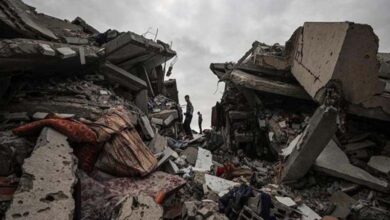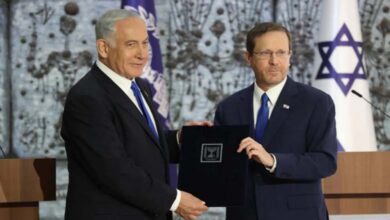Washington’s Secret Battle: Who’s Behind Houthi Financing?

In a region where competing interests and intelligence agencies clash along Red Sea shipping lanes, the United States has launched a new front against the Houthis. But this time, it’s not through airstrikes or aircraft carriers — it’s through a targeted pursuit of their financial lifelines. The U.S. State Department has announced a reward of up to $15 million for information that leads to dismantling the financial networks fueling the Houthi war machine — signaling a strategic shift in pressure tactics.
-
New Contacts Between the Muslim Brotherhood and the Houthis… Details
-
Houthis Hide Their Dead… Funerals Banned and Condolences Forbidden
This move comes amid growing international concern over attacks on commercial vessels and quiet diplomatic efforts aimed at convincing the Houthis to de-escalate their maritime aggression against Israel.
$15 Million: When Intelligence Becomes a Weapon
In a notable statement, the U.S. State Department’s Rewards for Justice program offered up to $15 million for information that could help disrupt the financial networks supporting the Houthis in Yemen. The U.S. isn’t just targeting their armed operations — it’s striking at the backbone of their resilience: funding.
-
The Demons’ Deal: Houthis Release Al-Qaeda Terrorists to Reinforce Their Frontlines
-
Houthi Forced Levies: Organized Looting of Citizens under the Pretext of Zakat
According to the U.S. government, the Houthis have carried out systematic attacks on commercial shipping in the Red Sea, leading to civilian deaths and forcing major international shipping companies to reroute. These operations, Washington claims, are locally organized but executed with external support — particularly from Iran.
From Military Warfare to Financial War
This pivot toward targeting the financial infrastructure suggests the limits of military options, especially in light of Iran’s indirect involvement.
Rather than relying on sporadic airstrikes with limited or controversial results, Washington is now betting on subtler, more potent tools: sanctions, tracking financial transfers, and collaborating with regional actors to uncover logistical and economic support channels.
-
Houthi and “Al-Shabab” Relationship: A Rising Threat to Navigation and East Africa
-
The Muslim Brotherhood and the Houthis… Playing Openly After “Under-the-Table” Alliances
The sources of Houthi funding have long been murky, ranging from direct Iranian backing, to illicit transfers through shell companies, to revenue from fuel smuggling and local taxation in areas under Houthi control.
Precise intelligence on these networks remains scarce, which explains the high-value reward aimed at encouraging insider leaks.
The Red Sea: A Theater of Tensions and Diplomacy
In parallel, The Wall Street Journal reported ongoing American diplomatic efforts to push the Houthis toward de-escalation, especially regarding their repeated attacks on Israel via the sea.
According to the report, U.S. officials are seeking a freeze on these attacks as part of broader arrangements that include a Yemen truce and securing maritime routes.
-
State of Panic and Anxiety among Houthi Terrorist Militias… Precautionary Measures Taken
-
“Tightened Measures”: Houthi Militias Hide Their Leader from “American Hell”
These efforts were echoed in statements by former President Donald Trump, who claimed the Houthis had “sent surrender signals” and requested an end to American airstrikes — an apparent unofficial admission of behind-the-scenes negotiations.
The U.S. Strategy: A Blend of Stick and Carrot
Analysts say the financial reward is more than just a tool to gather intelligence — it’s a double-edged pressure tactic. On one side, it threatens the group’s financial foundation; on the other, it creates openings for internal breaches that could dismantle support networks.
-
Human Rights Organization Records 13,000 Houthi Violations in Yemen’s Al-Bayda
-
Washington Allocates $15 Million to Disrupt Houthi Financing after Reclassifying Them as Terrorists
At the same time, Washington appears ready to offer diplomatic outcomes — perhaps even a non-escalation guarantee — if the Houthis comply by halting their attacks.
As plans emerge for limited naval escort missions to protect commercial ships, it’s clear that the U.S. continues to walk a tightrope between force and diplomacy.












